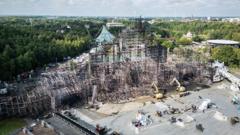Emergency crews are investigating the blaze that left thousands of passengers stranded and sparked fears about national energy security.
Heathrow Airport Shutdown: Fire Causes Travel Chaos

Heathrow Airport Shutdown: Fire Causes Travel Chaos
A power substation fire disrupts operations at Europe's busiest airport, raising concerns over infrastructure safety.
On Friday, investigators were busy sifting through the charred remnants of a power substation located close to Heathrow Airport, following a massive fire that forced the closure of one of the world's busiest travel destinations for nearly an entire day. Preliminary reports suggest that a fault in a high-voltage transformer ignited an oil-fed blaze that disrupted power to the airport and also affected tens of thousands of homes nearby.
Complications arose when systems meant to prevent such occurrences did not activate as expected, preventing electrical restoration from a neighboring transformer. As flights slowly resumed operations at Heathrow, questions remained about the initial cause of the fault.
The Metropolitan Police have assigned counterterrorism units to the case, emphasizing the fire's impact on critical national infrastructure due to its strategic location. However, both officials and energy experts lean towards the belief that the fire was an accidental event rather than a deliberate act. This uncertainty, regardless of the outcome, has left both local residents and international travelers feeling uneasy.
Concerns swirl around the potential for malicious attacks that could lead to such extensive disruptions, prompting a dialogue about the vulnerabilities of open societies like the UK. In parallel, if the incident results from an unnoticed deficiency in Britain's power grid, it may highlight the issues plaguing the nation's infrastructure at a time when investment is pressing.
In summary, the Heathrow Airport incident not only brought travel plans to a standstill but has also ignited discussions about the safety and reliability of the UK's energy system, urging both officials and citizens to reevaluate the current state of vital infrastructures.
Complications arose when systems meant to prevent such occurrences did not activate as expected, preventing electrical restoration from a neighboring transformer. As flights slowly resumed operations at Heathrow, questions remained about the initial cause of the fault.
The Metropolitan Police have assigned counterterrorism units to the case, emphasizing the fire's impact on critical national infrastructure due to its strategic location. However, both officials and energy experts lean towards the belief that the fire was an accidental event rather than a deliberate act. This uncertainty, regardless of the outcome, has left both local residents and international travelers feeling uneasy.
Concerns swirl around the potential for malicious attacks that could lead to such extensive disruptions, prompting a dialogue about the vulnerabilities of open societies like the UK. In parallel, if the incident results from an unnoticed deficiency in Britain's power grid, it may highlight the issues plaguing the nation's infrastructure at a time when investment is pressing.
In summary, the Heathrow Airport incident not only brought travel plans to a standstill but has also ignited discussions about the safety and reliability of the UK's energy system, urging both officials and citizens to reevaluate the current state of vital infrastructures.





















